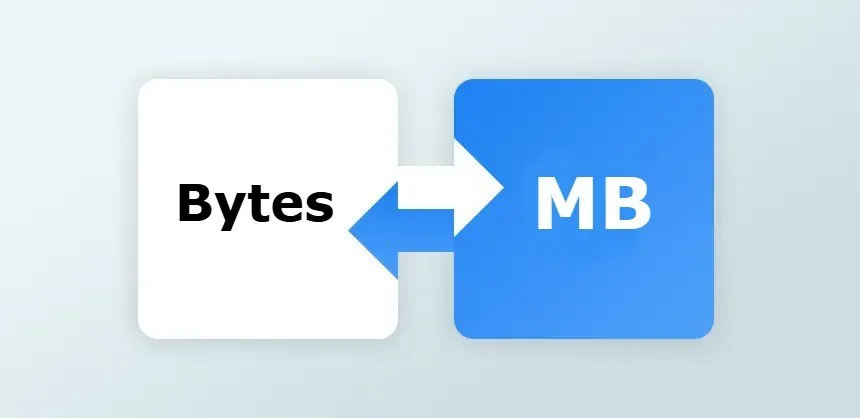Bytes to MB Converter - Convert Bytes to Megabytes & Other Units
Convert between bytes, kilobytes, megabytes, and other digital storage units. Understand data sizes at the fundamental byte level with real-world examples.
Enter the number of bytes to convert
Conversion Results
Enter bytes value and select conversion type to see results
Related & Other Popular Converters
If you're looking for a fast and easy way to convert a number of Bytes to Megabytes, look no further than our Bytes to MB Converter tool. It's a free tool that you can access online, and it generates accurate conversion results in an instant. Our Bytes to MB online converter is exceptionally useful for converting measurements of digital storage - bytes, kilobytes, megabytes, gigabytes, and more for programmers, IT specialists, university students, and anyone else involved in data size conversions.

What is a Byte and a Megabyte?
A Byte (B) is simply the lowest measurement of digital information, commonly measured in representing a single character like a letter or a number in computing and technology.
A Megabyte (MB) is much larger as a measurement of digital storage and is used to measure file sizes, memory capacity, and volume of data downloaded or transferred.
In most systems:
Our Bytes to MB Converter automatically handles both conversions accurately.
How to Convert Bytes to Megabytes
The formula to convert Bytes to Megabytes is straightforward:
Megabytes (MB) = Bytes (B) ÷ 1,048,576
For example:
If you have 2,097,152 Bytes, the conversion is:
2,097,152 ÷ 1,048,576 = 2MB
No need to calculate manually - simply enter your value in our byte mb converter, and it instantly gives you the converted result with options for KB, GB, and TB as well.
Why use our Bytes to MB Converter
Whether you are analyzing the available storage capacity of a device, comparing file sizes or managing your data usage, your bytes to mb converter will always produce accurate results.
Common uses of Bytes to Megabytes Conversion
It is important to calculate Bytes to Megabytes for optimizing the performance of data and other digital materials in the fast-paced world we live in.
Conversion Table (Bytes to MB)
| Bytes (B) | Megabytes (MB) |
|---|---|
| 1,024,000 B | 0.98 MB |
| 1,048,576 B | 1 MB |
| 10,485,760 B | 10 MB |
| 104,857,600 B | 100 MB |
| 1,048,576,000 B | 1000 MB |
Use the table above for quick reference, or try our bytes to mb converter for custom values.
Conversion Formula (Binary and Decimal)
The binary standard is the determined standard to use in operating systems (ex: Windows and macOS), while the decimal standard is the determined standard for hard drive manufacturers. Our byte mb converter gives you the two calculated methods for complete accuracy.
Using Bytes to Megabytes conversion allows you to make more informed decisions about your data storage, use of memory, and maximize performance. Whether you are analyzing image sizes, managing cloud storage, or checking web assets - our Bytes to MB Converter calculates in seconds and gives you an answer at the click of a button!
FAQs
Using the binary standard there are 1,048,576 Bytes in 1 Megabyte, and using the decimal standard there are 1,000,000 Bytes.
The easiest way is to take the number of Bytes and divide it by 1,048,576 — or use our Bytes to MB Converter to do it for you in a snap.
Systems use binary (base 2) or decimal (base 10) standards, which are slightly different depending on the number of thousand, and this leads to different MB sizes for the same number of Bytes.
Yes! Our byte mb converter allows for two-way conversion. You can convert MB to Bytes or Bytes to MB for whichever calculation you need.
MB (Megabyte) is the decimal standard, and MiB (Mebibyte) is a binary standard. 1 MiB = 1,048,576 Bytes.
Manufacturers use decimal (1MB = 1,000,000 Bytes) measurement, while computers use binary (1MB = 1,048,576 Bytes) memory calculation. This is why there is a visible difference of the size displayed.